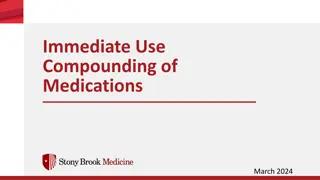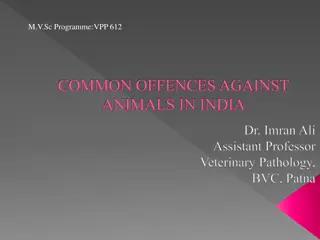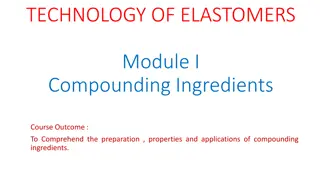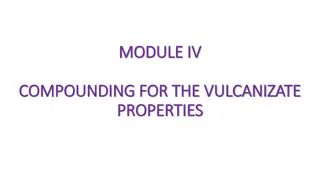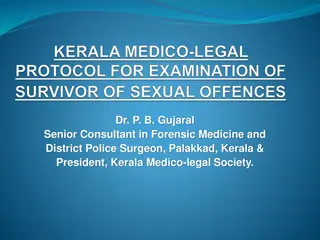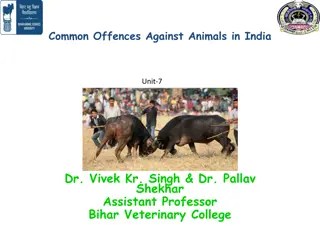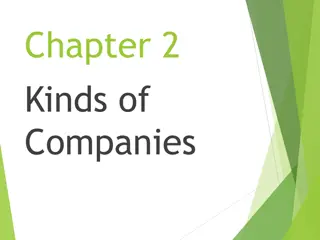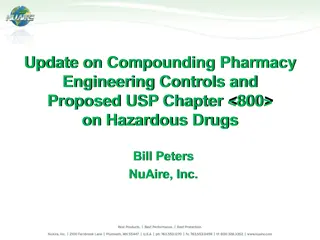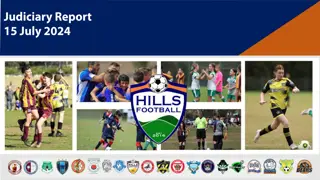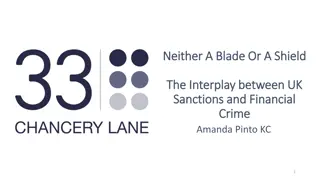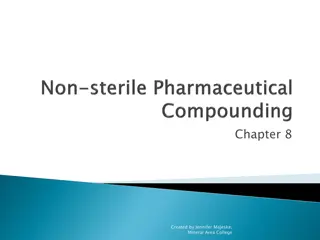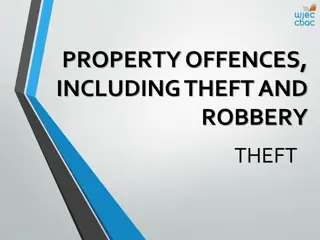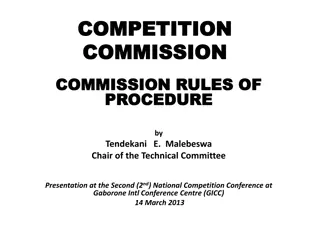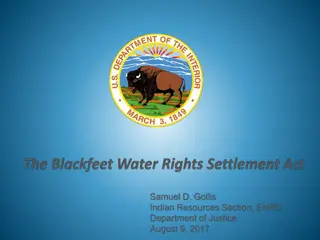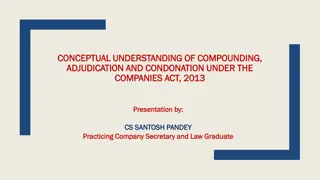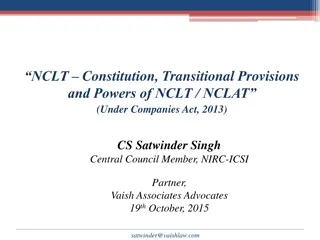Conference on Adjudication and Compounding of Offences under Companies Act, 2013
The Two Days Regional Conference of ICSI WIRC focusing on the facilitation of corporate growth through discussions on adjudication and compounding of offences under the Companies Act, 2013. The event, presented by CS (Dr.) D.K. Jain, covers topics like fraud, wrongful gain and loss, punishment for fraud, and false statements in relation to company affairs. Detailed explanations and legal provisions regarding fraud and false statements are highlighted.
Download Presentation

Please find below an Image/Link to download the presentation.
The content on the website is provided AS IS for your information and personal use only. It may not be sold, licensed, or shared on other websites without obtaining consent from the author. Download presentation by click this link. If you encounter any issues during the download, it is possible that the publisher has removed the file from their server.
E N D
Presentation Transcript
Two Days Regional Conference of ICSI WIRC on CS: The Facilitator for Corporate Growth On the Topic Adjudication And Compounding of Offencs under the Companies Act, 2013 on Saturday, the 14 Saturday, the 14th th May 2022 May 2022 Presented By: CS (Dr.) D.K. Jain M. Com, FCS, ACIS (UK) IP, RV (SFA), Ph. d. Practising Company Secretary, Insolvency Professional & Registered Valuer (SFA)
Fraud, Wrongful Gain and Wrongful Loss Fraud, Wrongful Gain and Wrongful Loss [Explanation to section 447] Fraud: Fraud in relation to affairs of a company or any body corporate, includes; any act, omission, concealment of any fact; or abuse of position committed by any person; or any other person with the connivance in any manner, with intent to deceive, to - gain undue advantage from, or - toinjure the interests of the company or its shareholders or its creditors or any other person, whether or not there is any wrongful gain or wrongful loss; Wrongfulgain Means the gain by unlawful means of property to which person gaining is not legally entitled. Wrongfulloss Means the loss by unlawful means of property to which the person losing is legally entitled.
Punishment for Fraud Punishment for Fraud shall be subject to minimum amount of fine/imprisonment as prescribed [Sec.447(1) w.e.f. 2-11-2018] is a Cognizable Offence Without prejudice to any liability including repayment of any debt under this Act or any other law for the time being in force, any person who is found to be guilty of fraud involving an amount of at least Rs.10 Lakh or 1% of the turnover of the company, whichever is lower, shall be punishable with imprisonment for a term which shall not be less than 6 months but may extend to 10 years and shall also be liable to fine which shall not be less than the amount involved in the fraud, but which may extend to 3 times the amount involved in the fraud: Where the fraud in question involves public interest, the term of imprisonment shall not be less than 3 years. Where the fraud involves an amount less than Rs.10 Lakh or 1% of the turnover of the company, whichever is lower, and does not involve public interest, any person guilty of such fraud shall be punishable with imprisonment for a term which may extend to 5 years or with fine which may extend to Rs.50 Lakh or with both.
False Statements Attention is drawn to provisions of section 448 and 449 which provide for punishment for false statement/certificate and punishment for false evidence respectively False Statements [Section 448 w.e.f. 12.09.2013] If in any; return, report, certificate, financial statement, prospectus, Statement; or other document required by or for the purposes of any of the provisions of CA-2013, any person (Includes Professionals) makesany material particular a statement: (a) which is false in, knowing it to be false; or (b) which omits any material fact knowing it to be material;
Punishment and Liability for False Statements Punishment for False Statement [Section 448] As per section 447 of the CA-2013 Liability for False Statements is only on the person who gave wrong information Where wrong information was furnished by company to ROC, only person, who gave wrong information, was liable to be prosecuted u/s 448 and prosecution of other directors or MD would be illegal. [Vijay Kumar Gupta v ROC (2004) 118 Comp Cas 604 (HP): (2003) CLC 777 (HP)] Offence committed by agent cannot be passed on to the principal Offence if any committed by the agent cannot be passed on to the principal because such vicarious liability under criminal law does not arise between the agent and principal. [Ramakrishna Raja v ROC (2005) 123 Comp Cas 319 (Mad)]
False Evidence Penalty for False Evidence [Section 449 w.e.f. 12.09.2013] Non-Compoundable If any person intentionally gives false evidence: (a) upon any examination upon oath or solemn affirmation, authorised under this Act; or (b) in any affidavit, deposition or affirmation, in or about the winding up of any company under this Act, or otherwise in or about any matter arising under this Act; he shall be punishable with imprisonment for a term which shall not be less than 3 years but which may extend to 7 years and with fine which may extend to Rs.10 lakh. Penalty in case where no specific penalty is provided elsewhere [Sec. 450 w.e.f. 21-12- 2020.] Compoundable Offence If a company or any officer of the company or any other person contravenes any provision of the CA-2013, for which no specific punishment is provided elsewhere in this Act, the company and every officer who is in default or such other person shall be liable to a penalty of Rs.10,000, and in case of continuing contravention, with a further penalty of Rs.1,000 for each day during which the contravention continues, subject to a max. of Rs. 2 Lakhs on company and Rs. 50,000 on an officer who is in default or any other person.
Punishment for Repeated Default Punishment in case of Repeated Default [Section 451] Compoundable If a company or an officer of a company commits an offence punishable either with fine or with imprisonment and where the same offence is committed for the second or subsequent occasions within a period of 3 years, then, that company and every officer thereof who is in default shall be punishable with twice the amount of fine for such offence in addition to any imprisonment provided for that offence.
Powers of the Central Government Powers of the Central Govt. to exempt certain companies from the provisions of the CA-2013 [Section 462] The Central Govt. may in the public interest, by notification direct that any of the provisions of this Act, (a) shall not apply to such class or classes of companies; or (b) shall apply to the class or classes of companies with such exceptions, modifications and adaptations as may be specified in the notification. The Central Govt., exercised these powers and granted exemption from applicability of various provisions of the sections of the Companies Act, 2013 to certain types of companies like, Private Limited, OPC, Small, Start up, Government, Section 8, Producer, IFSC Companies etc. from time to time.
Applicability of Limitation Act, 1963 Limitation of period for filing complaint in court in certain cases [Section 468 of Cr. P. C.] The criminal proceedings are liable to be quashed after the expiry of the period of Limitation and the Magistrate cannot take cognizance of the alleged offences after the expiry of the period of Limitation as provided u/s 468 of Cr PC. [Mohanraj M Singhi v State of Gujarat (2016) 135 CLA 74 (Guj)] A Complaint for violation of the provisions of the Companies Act, 2013 should be filed to try the offence u/s 468 of Cr. P.C. within the period of limitation as under; 6 Months If the offence is punishable with filne only 1 years If the offence is punishable with imprisonment not exceeding 1 years 3 years If the offence is punishable with imprisonment not exceeding 3 years No Limitation If the offence is punishable with imprisonment exceeding 3 years (a) From the date of commencement of offence; or (b) where the offence was not known, the 1st day on which offence was come to the knowledge Commencement of Limitation
Power of the Court to grant relief in certain cases Section 463 gives the Court the power to relieve a director from any liability, which may incur under the law for getting the relief the section provides that the court must be satisfied that the defaulting director acted honestly and reasonably and that having regard to all the circumstances of the case he ought to be excused. It has been stated under the section that: - If in any proceeding for negligence, default, breach of duty, misfeasance or breach of trust against an officer of a company, it appears to the Court hearing the case that he is or may be liable in respect of the negligence, default, breach of duty, misfeasance or breach of trust, but that he has acted honestly and reasonably the Court may relieve him either wholly or partly, from his liability on such terms as it may think fit, if it comes to the Court to the conclusion that he ought fairly to be excused having regard to all the circumstances of the case including his appointment. [Section 463(1)] - In case of criminal proceeding u/s 462, the Court shall have no power to grant relief from any civil liability which may attach to an officer in respect of such negligence, default, breach of duty, misfeasance or breach of trust.
Powers of the Court to Grant Relief - For seeking anticipatory relief from the High Court, where any such officer has reason to apprehence that any proceeding will or might be brought against him in respect of any negligence, default, breach of duty, misfeasance or breach of trust, he may apply to the High Court for relief and the High Court on such application shall have the same power to relieve him as it would have had if it had been a court before which a proceeding against that officer for negligence, default, breach of duty, misfeasance or breach of trust had been brought u/s 463(1). - The section thus operates in two stages. The High Court can grant anticipatory relief and if a case actually initiated, only such court before which the complaint or trial is going on can grant relief. [Shrikrishna Prasad v ROC (1978) 48 Comp Cas 397 (Del)] - No Court shall grant any relief to any officer u/s 463(1) or (2) unless it has, by notice served in the manner specified by it, required the ROC and such other person, if any, as it thinks necessary, to show cause why such relief should not be granted.
Powers of the Court to Grant Relief The granting of relief u/s 463 is discretionary and it cannot be claimed as a matter of right. The Court has to examine applications at the appropriate stage. Though an application could be maintained even at the stage of apprehension of any criminal proceedings, yet the Court has to come to the conclusion that there is prima facie material that offence has been made out and a direction should be given. It may be partial or complete or on certain terms or unconditional. [Farouk Irani v Board for Industrial & Financial Reconstruction (2002) 110 Comp Cas 64 (Mad): (2002) 38 SCL 95 (Mad)] Section 463 does not make any distinction between MD/WTD and part-time directors, as liability for such acts is equal. However, part-time directors are relieved from liability, where there is no evidence of their exercising control in any manner is brought forth. [Nambiar v ROC (2002) 108 Comp Cas 1 (Mad)] It is an officer of the company only can be exempted from being relieved from being prosecuted in any proceedings for negligence, default, breach of duty, misfeasance or breach of trust and not the company. Company itself does not fall within the definition of an 'officer' of the company and could not be exempted from prosecution in terms of section 463. [Sardar Satwant Singh v ROC (1995) 18 CLA 177 (P&H)] - - -
Powers of the Court to Grant Relief - No relief can be given if person did not act reasonably, though he may have acted honestly. If a director without seeking legal advice does an act in which he is expected to seek legal advice, and causes loss to company, he does not act reasonably and cannot be excused. - Where director of company stood guarantor for loan taken by company and on failure to pay said loan, decree was passed against company, objection of director that decree was not executable against him did not fall under scope of section 463 [Endra Kumar Kedawat v Apple Ceremics Ltd. (2006) 129 Comp Cas 816 (Raj)]
Factors Determining level of Punishment Factors Determining level of Punishment (Section 446A w.e.f. 09.02.2018) The Court or the Special Court, while deciding the amount of fine or imprisonment under the Companies Act, 2013 shall have due regard to the following factors, namely: (a)size of the company; (b)nature of business carried on by the company; (c)injury to public interest; (d)nature of the default; and (e)repetition of the default.
Lesser Penalties for certain Companies Lesser Penalties for certain Companies [Section 446B w.e.f. 22-01-2021] Notwithstanding anything contained in this Act, if penalty is payable for non- compliance of any of the provisions of the Companies Act by a OPC, small, start-up or Producer Company, or by any of its officer in default, or any other person in respect of such company, then such company, its officer in default or any other person, as the case may be shall be liable to a penalty which shall not be more than of the penalty specified in such provisions subject to a; - Maximum of Rs. 2 lakh in case of a company; and - Maximum of Rs. 1 lakh in case of an officer who is in default or any other person, as the case may be. Explanation. For the purposes of this section, (a) "Producer Company" means a company as defined in section 378A(1); (b) "start-up company" means a Private Company incorporated and recognised as start-up in accordance with the notification issued by the Central Govt., Department for Promotion of Industry and Internal Trade.]
Dealing with the Offences committed by a Company and its Officers Manner to Regularise the offences/violations committed by the Company and its officer or any other persons under the provisions of the Companies Act, 2013 - Imposition of fine by the Special Court on the compliant filed by the ROC or Shareholders, etc. u/s 436 (Appealable) - Adjudication of Penalty by the ROC; u/s 454 (Appealable) - Compounding of offences offered by Company and/or its officers; u/s 441 (Not Appealable) (a) By the Regional Director; or (b) By the Tribunal - Filing of documents under the various Company Law Settlement Scheme, etc under the Companies Act, 2013: u/s 92, 137, 403, 451 & 460, etc (Immunity granted)
Compounding of Offence by The Regional Director; or The National Company Law Tribunal u/s 441 of the Companies Act, 2013
Meaning of Compounding As per Black s Law Compounding means to settle a matter by a money payment in lieu of other liability Whereas Offence means u/s 2(n) of the Cr. P.C. any act or omission made punishable by any law for the time being in force . - Section 320 of the Cr.P.C. permit compounding of various offences under IPC, whereas Section 441 of CA-2013 permit certain offences for compounding which are of a private nature and relatively not serious; - Compounding is a process whereby an accused pay compounding fee/charges in lieu of consequences of prosecution; - Compounding allows the accused to avoid a lengthy process of criminal prosecution, which would save time, cost, mental agony, etc. in return for payment of compounding charges; - Fine and imprisonment can be imposed by the Court, however instead of going court offender may prefer for compounding and agree to pay composition amount imposed by quasi judicial authority (NCLT/RD) - Compounding is compromise between the administrator and person commit offence for an agreement not to prosecute one who has committed offence[Reliance Industries Ltd. 1997] . The accuse and Administrator (ROC) make a joint application to the NCLT/RD that the parties have come to terms and the case may not be proceeded further.
Compounding of Certain Offences Compoundable Offences [Section 441(1)] Notwithstanding anything contained in the Cr. P.C. 1973 any offence punishable under this Act whether committed; - by a company; or - any officer thereof not being an offence punishable with imprisonment only, or punishable with imprisonment and also with fine, may, either before or after the institution of any prosecution, be compounded by Compounding Authority (a) the Tribunal (NCLT); (No restriction on the Minimum & maximum fine) or (b) where the maximum amount of fine which may be imposed for such offence does not exceed Rs. 25 lakh, by the RD or any officer authorised by the Central Govt. on payment or credit, by the company or, the officer, to MCA e-payment portal of such sum as that NCLT or the RD or any officer authorised by the Central Govt. may specify:
Compounding of Certain Offences Maximum Compounding Fee The penalty so specified shall not, in any case, exceed the maximum amount of the fine which may be imposed for the offence so compounded: Additional fee, if any, paid shall be deductible from compounding fee In specifying the sum required to be paid or credited for the compounding of an offence u/s 441(1), the amount if any, paid as additional fee u/s 403(2) shall be taken into account: Compounding not permissible in certain cases - If the investigation against such company has been initiated or is pending under the CA-2013. - an offence committed by a company or its officer within a period of 3 years from the date on which a similar offence committed by it or him was compounded u/s 441. - Notwithstanding anything contained in the Cr. PC 1973, any offence which is punishable under CA-2013 with imprisonment only or with imprisonment and also with fine shall not be compoundable. [Section 441(6)] Explanation. Any second or subsequent offence committed after the expiry of a period of 3 years from date on which the offence was previously compounded, shall be deemed first offence;
Compounding of Certain Offences Application for compounding needs to be filed with the ROC [Section 441(3)(a)] Every application for the compounding of an offence shall be made to the ROC in the Form GNL-1 along with the application to RD and in Form NCLT-9 to NCLT who shall forward the same, together with his comments thereon, to the NCLT or the RD or any officer authorised by the Central Govt. as the case may be. Intimation for Compounding by Company to ROC within 7 days [Section 441(3)(b)] Where any offence is compounded u/s 441, whether before or after the institution of any prosecution, an intimation thereof shall be given by the company to the ROC within 7 days from the date on which the offence is so compounded. No prosecution shall be initiated if the offence is compounded [Section 441(3)(c)] Where any offence is compounded before the institution of any prosecution, no prosecution shall be instituted in relation to such offence, either by the ROC or by any shareholder or by any person authorised by the Central Govt. against the offender in relation to whom the offence is so compounded.
Compounding of Certain Offences Intimation by ROC for compounding application to Court [Section 441(3)(d)] Where the compounding of any offence is made after the institution of any prosecution, such compounding shall be brought by the ROC in writing, to the notice of the court in which the prosecution is pending and on such notice of the compounding of the offence being given, the company or its officer in relation to whom the offence is so compounded shall be discharged. Compounding Authority may give direction for filing & payment of fee [Sec. 441(4)] The NCLT or the RD or any officer authorised by the Central Govt. as the case may be, while dealing with a proposal for the compounding of an offence for a default which requires a company or its officer to file or register with, or deliver or send to, the ROC any return, account or other document, may direct, by an order, if it or he thinks fit to do so, any officer or other employee of the company to file or register with, or on payment of the fee, and the additional fee, required to be paid u/s 403, such return, account or other document within such time as may be specified in the order.
Compounding of Certain Offences Consequences on failure to comply with the Compounding order [Sec. 441(5)] If any officer or other employee of the company who fails to comply with any order made by the NCLT or the RD or any officer authorised by the Central Govt. u/s 441(4), the maximum amount of fine for the offence proposed to be compounded u/s 441 shall be twice the amount provided in the corresponding section in which punishment for such offence is provided.
Compounding of Certain Offences Procedure to compound an offence under Companies Act, 2013: a) The ROC issue show cause notice to the Company and its officer and call information, even before issuance of show cause notice by ROC, offender can suo moto apply for compounding; b) Only the Company and its officer may apply therefore trustee, professionals and liquidator are not eligible c) Calling of Board Meeting as per Companies Act, 2013 and SS-1. d) Calculate the amount of maximum penalty as per the relevant section. e) Hold Board meeting, pass a resolution for authority to file application and authorize director/ CS, etc. and professional for preparation and signing of documents including application. f) Preparation of compounding application as per NCLT Rules or otherwise. g) Filling of Form with ROC e-form GNL1 attached with the Application for Compounding/ Form NCLT-9 if applicable. This form will be forwarded by ROC to NCLT/RD as applicable. The NCLT Rules 2016 has prescribed a fee of Rs, 1,000/- on an application for compounding of certain offences.
Compounding of Certain Offences Procedure to compound an offence under Companies Act, 2013: h) In GNL 1, the application can be filed for Company, its Director or Manager/Secretary or CEO/CFO or other officers of the Company (even jointly). Details of only 8 persons can be entered in the e-Form. If number of persons is greater than 8, then additional details can be provided in optional attachment. It is advisable to file separate application for each director, etc i) Hearing before Authority: normally, NCLT/RD will give personal hearing and then pass a speaking order giving reasons. Hearing can be attended by Director/ secretary/ officer of Company or by authorized person like advocate or practicing CS/ CA/ CMA. j) Where any offence is compounded, intimation thereof shall be given by the company to the ROC within 7 days from the date on which the order is made available to the petitioner/applicant. k) Permission of Special Court not required: As per section 441(6)(a) permission of the Special Court is not required for compounding of any offence which is punishable under this Act, with imprisonment or fine, or with both w.e.f. 02.11.2018.
Compounding of Certain Offences Discretionary power to reject the Application? The Compounding application cannot be rejected without due consideration. The CLB (now NCLT) in the case of Amadhi Investments Ltd., held that neither of the CLB or the RD has been authorized with discretionary power to reject a compounding application without due consideration. The Compounding application may be rejected if the default not made good. Whether NCLT has powers to review its own decision? The NCLAT in the case APC Credit Rating Pvt. Ltd. vs ROC, NCLT of Delhi and Haryana, [2018] 143 CLA 166 had answered the above question, the NCLAT held that; it is clear that there is no inherent power to review, as is under Order 47 Rule 11 of the Code of Civil Procedure, 1980 but the Tribunal has power conferred by section 420(2) of the Act, 2013 to rectify any mistake apparent from the record and to amend the order accordingly. Therefore, we can categorically say that NCLT has no power to review its own orders unless the statue is amended to make way for such review. From the above decision of NCLAT it is clear that inherent powers under Rule 11 of the NCLT Rules can t be said to be empowering NCLT with a power to review.
Compounding of Certain Offences Payment of Compounding fee: DCA General Circular dated 28.04.1993 has clarified that the compounding fee on the company shall be paid from the Companies Fund. However, the directors/officers in default should pay the composition fee from their personal fund. Compounding not amount to convection by a Court of Law Prohibition contained in Schedule V of the Companies Act, 2013 does not apply for appointment of a director, MD and WTD, Manager
Adjudication of Penalties by the Registrar of Companies u/s 454 of the Companies Act, 2013
Adjudication of Penalty u/s 454 Appointment of Adjudicating Officer (AA) [Rule 3(1)] The Central Govt. may appoint any of its officers, not below the rank of Registrar, as AA for adjudging penalty under the provisions of the Companies Act, 2013. Imposition of Penalty by the AA [Section 454(3) w.e.f. 02-11-2018] The AAmay, by an order (a) impose the penalty on the company, the officer who is in default, or any other person stating therein any non-compliance or default under the relevant provisions of this Act; and (b) direct such company, or officer who is in default, or any other person, as the case may be, to rectify the default, wherever he considers fit. No penalty shall be imposed and all proceedings in respect of default shall be deemed to be concluded if such default has been rectified either prior to, or within 30 days of, the issue of the notice [A new proviso have been inserted by the Companies (Amendment) Act, 2020 [W.e.f. 22.01.2021] which provides that in case the default relates to non-compliance of section 92(4) or 94(1) or section 137(2) and such default has been rectified either prior to, or within 30 days of, the issue of the notice by the adjudicating officer, no penalty shall be imposed in this regard and all proceedings u/s 454 in respect of such default shall be deemed to be concluded.
Adjudication of Penalty u/s 454 Notice by the AA with nature of non-compliance [Section 454(4) read with Rule 3(2)] Before adjudging penalty, the adjudicating officer shall issue a written notice in the specified manner, to the company, to the officer, who is in default or any other person, as the case may be, to show cause, within such period not being less than 15 days and more than 30 days from the date of service, why the inquiry should not be imposed on it or him: Provided that every notice issued under this sub-rule, shall clearly indicate the nature of non-compliance or default under the Act alleged to have been committed or made by such company and officer in default, as the case may be. Extension of period for reply by the AA The AA may, for reasons to be recorded in writing, extend the period referred to above by a further period not exceeding 15 days, if the company or officer (as applicable) satisfies the AA that it has sufficient cause for not responding to the notice within the stipulated period.
Adjudication of Penalty u/s 454 Indication of the penal provisions under the Act [Rule 3(3)] Every notice issued under rule 3(2) shall clearly indicate the nature of non compliance or default under the Act alleged to have been committed or made by such company, officer in default, or any other person, as the case may be and also draw attention to the relevant penal provisions of the Act and the maximum penalty which can be imposed on the company, and each of the officers in default, or the other person. Reply of Notice to be in electronic form and extension of the reply period [Rule 3(4)] The reply to such notice shall be filed in electronic mode only within the period as specified in the notice or of the extended period not exceeding 15 days, if the company or officer in default or any person as the case may be, satisfies the AA that it or he has sufficient cause for not responding to the notice within the stipulated period or the AA has reason to believe that the company or the officer or the person has received a shorter notice and did not have reasonable time to give reply.
Adjudication of Penalty u/s 454 Power of the AA to call for Physical Appearance [Rule 3(5)] If, after considering the reply submitted by such company, its officer, or any other person, as the case may be, the AA is of the opinion that physical appearance is required, he shall issue a notice, within a period of 10 working days from the date of receipt of reply fixing a date for the appearance of such company, through its authorised representative, or officer of such company, or any other person, whether personally or through his authorised representative: Provided that if any person, to whom a notice is issued under sub-rule (2), desires to make an oral representation, whether personally or through his authorised representative and has indicated the same while submitting his reply in electronic mode, the AA shall allow such person to make such representation after fixing a date of appearance.
Adjudication of Penalty u/s 454 Time limits for exercising the Powers by the AA [Rule 3(7)] The AA shall pass an order, (a)within 30 days of the expiry of the period referred in rule 3(2) or of such extended period as referred therein, where physical appearance was not required under rule 3(5); (b)within 90 days of the date of issue of notice under Rule 3(2), where any person appeared before the AA under Rule 3(5): Provided that in case an order is passed after the afore mentioned duration, the reasons of the delay shall be recorded by the AA and no such order shall be invalid merely because of its passing after the expiry of such 30 days or 90 days as the case may be. Service of copy of the Orders of the AA [Rule 3(9)] The AA shall send a copy of the order passed by him to the concerned company, officer who is in default or any other person or all of them and to the Central Govt. and a copy of the order shall also be uploaded on the website.
Quantum of Penalty on Adjudication u/s 454 Quantum of Penalty [Rule 3(12)] While adjudging quantum of penalty, AA shall have due regard to following factors, : (a) size of the company; (b) nature of business carried on by the company; (c) injury to public interest; (d) nature of the default; (e) repetition of the default; (f) the amount of disproportionate gain or unfair advantage, wherever quantifiable, made as a result of the default; and (g) the amount of loss caused to an investor or group of investors or creditors as a result of the default: Provided that, in no case, the penalty imposed shall be less than the minimum penalty prescribed, if any, under the relevant section of the Act. Penalty shall be paid through MCA portal only.
Appeal Against of Order of Adjudication u/s 454 Appeal if any against the orders of the AA [Section 454(5) and (6) read with Rule 4(1)] Every appeal against the order of the AA shall be filed in writing with the RD within a period of 60 days from the date of receipt of the order of AA, by the aggrieved party, in Form ADJ setting forth the grounds of appeal and shall be accompanied by a certified copy of the order against which the appeal is sought. An appeal shall not seek relief(s) therein against more than one order unless the reliefs prayed for are consequential.
Appeal Against of Order of Adjudication u/s 454 Disposal of appeal by the RD [Rule 6(1)] On the admission of the appeal, the RD shall serve a copy of appeal to the AA against whose order the appeal is sought along-with a notice requiring such AA to file his reply thereto within such period, not exceeding 21 days, as may be stipulated by the RD in the said notice. The RD may extend time for a further period of 21 days, if the AA satisfies the RD that he had sufficient cause for not being able to file his reply to the appeal. A copy of every reply, application or written representation filed by the AA before the RD shall be forthwith served on the appellant by the AA. The RD shall notify the date of hearing of the appeal not be a date earlier than 30 days following the date of such notification for hearing of the appeal. On the date fixed for hearing the RD may, subject to the reasons to be recorded in writing, pass any order as he thinks fit including an order for adjournment of the hearing to a future date. In case the appellant or the AA does not appear on the date fixed for hearing, the RD may dispose of the appeal ex-parte: Providedthat where the appellant appears afterwards and satisfies the RD that there was sufficient cause for his non-appearance, the RD may make an order setting aside the ex-parte order and restore the appeal.
Appeal Against of Order of Adjudication u/s 454 Order of the RD on appeal [Rule 6(6) & (7)] Every order passed under this rule shall be dated and signed by the RD. A certified copy of every order passed by the RD shall be communicated to the AA and to the appellant forthwith and to the Central Govt. The Company needs to file a copy of the Orders to the Registrar in the Form INC-28 within 30 days of the order.
Penalty for repeated Defaults u/s 454A New Section 454A Penalty for repeated Defaults (w.e.f. 02.11.2018) Provides that where; - a company; or - an officer of a company; or - any other person having already been subjected to penalty for default under any provisions of this Act, again commits such default within a period of 3 years from the date of order imposing such penalty passed by the AA or the RD, as the case may be, It or he shall be liable for the second or subsequent defaults for an amount equal to twice the amount of penalty provided for such default under the relevant provisions of this Act.
Protection of action taken in good faith u/s 456 No suit, prosecution or other legal proceeding shall lie against; - the Govt.; or - any officer of the Govt. ; - or any other person; in respect of anything which is in good faith done or intended to be done in pursuance of this Act or of any rules or orders made thereunder, or in respect of the publication by or under the authority of the Govt. or such officer, of any report, paper or proceedings.
Brief Comparison between Adjudication, Compounding and fine imposed by the Court Particular Adjudication Compounding Fine and or Impriosnment by the Court Section Nature of default 454 Liable to Penalty 441 Punishable with fine or imprisonment or both 436, 463 Punishable with fine and imprisonment Authority ROC RD upto maximum Rs. 25 Lakhs fine NCLT- No restriction No restriction Who may take action By the ROC at his discretion Company and its officer in default By the ROC, Central Govt. Offender is covered Company officer in default and other person Yes to RD Company and Officer in Default No as it is a settlement Company officer in default and other person Yes to higher Court Order is Apeable Discretionary power Not less than Minimum Penalty Having absolute discretion Having absolute discretion Power to grant relief Yes, not less then the minimum penalty Yes Yes, to the directors and officers in default only
Brief Comparison between Adjudication, Compounding and fine imposed by the Court Particular Adjudication Compounding Fine and or Impriosnment by the Court Compulsorily required Offender, Advocate Personal appearance May require Who may appear/ represent before the Authority Filing fee on application by the offender Time in discharge of offence Pre-condition May Require Offender, PCA, PCA, Advocate Offender, PCS, PCA, Advocate No Yes No About 3 months About 4 months Lengthy and time consuming procedure - - After complying of the defaults with clean hands
List of compoundable offences under the Companies Act, 2013 as amended by Companies (Amendment) Act, 2020 A. Offences compoundable by the NCLT Section: 8(11) - default by company in complying with the requirements relating to formation of companies with charitable objects etc. Section:46(5) - Fraudulently issuing duplicate share certificates by a company. Section:129(7) - Failure to keep proper financial statement Section:135(7) Default by Company in compliance of sub section (5) or (6) Section:245(7) - Committing default in complying with the order of Tribunal under this section. Section:316(2)-Failure to send quarterly report on winding up and call meeting by comp. liquidator.
List of compoundable offences under the Companies Act, 2013 as amended by Companies (Amendment) Act, 2020 B. Offences compoundable by the Regional Director Section:8(11) - Default by officer in complying with the requirements relating to formation of companies with charitable objects etc. Section:16(3) - Default of company in complying with the directions issued u/s 16(1) relating to rectification of name of company. Section:26(9) - Violations of provisions relating to issue of a prospectus. Section:40(5) - Default of company in complying with the provisions of this section relating to securities to be dealt with in stock exchanges Section:53(3) - contravention of provisions relating to issue of shares at discount. Section:56(6) - Failure of company to comply with the provision relating transfer and transmission of securities under sub-section (1) to (5). Section:64(2) - Default in filing a notice related to alteration, increase or redemption of share capital along with the altered memorandum with the Registrar. Section:67(5) - Contravention of provisions relating to purchase by company or loans by company for purchase of its own shares. Section:68(11) - If a company makes any default in complying with the provisions of this section or any regulation made by the SEBI relating to buy back of securities.
List of compoundable offences under the Companies Act, 2013 as amended by Companies (Amendment) Act, 2020 B. Offences compoundable by the Regional Director Section:86(1) - Violation of any provision relating to Registration of Charges (Chapter VI). Section:88(5) - Failure to maintain register of members/debenture-holders/ other security holders as may be prescribed. Section:89(5) - Failure to file declaration not holding beneficial interest in any share. Section:89(7) - Failure to file return relating to beneficial interest in any share before the expiry of the time specified u/s 403(1)(i) proviso. Section:90(10)- False declaration by the SBO Section:92(5) - Failure to file annual return before the expiry of the period specified u/s 403 with additional fee. Section:92(6) - If a company secretary in practice certifies the annual return not in conformity with the requirements of this section or the rules made there under. Section:99-Default in holding a meeting of the company u/s 96/97/98 or in complying with any directions made by Tribunal. Section:102(5)- Default in complying with the provisions of this section relating to statement to be attached to the notice. Section:105(3) - If default is made in complying with sub-section (2) pertaining to proxies. Section:105(5) - If invitations to appoint as proxy a person or one of a number of persons specified in the invitations are issued.
List of compoundable offences under the Companies Act, 2013 as amended by Companies (Amendment) Act, 2020 B. Offences compoundable by the Regional Director Section:117(2) - Failure in filing with the Registrar the copy of notice or agreement within stipulated time. Section:121(3)-Failure to file Report on annual General meeting. Section:124(7) - Failure to transfer the amount of accumulated profits to unpaid dividend account and violating other provisions of section 124. Section:128(6) - Failure to keep proper books of account. Section:134(8) - Default in complying with the provisions regarding financial statement and Board s report. Section:135(7) Default by officer in default in compliance of sub section (5) or (6) Section:137(3) - Failure to file financial statements with the Registrar. Section:140(3) - Non-Compliance by auditor of subsection (2) relating to filing of resignation information. Section:143(15) - Failure of auditor to intimate to Central Govt. regarding fraud against company by officers or employees. Section:147(1) - Failure of company to comply with provisions of sections 139 to 146 with regard to auditors. Section:147(2) - Failure of company to comply with the provisions of sections 139 to 146 with regard to auditors. Section:157(2) - Failure to furnish DIN to Registrar. Section:159 - Contravention of the provision's u/s 152, 155 and 156. Section:165(6) - Acting as a director of more than 20 companies.
List of compoundable offences under the Companies Act, 2013 as amended by Companies (Amendment) Act, 2020 B. Offences compoundable by the Regional Director Section:166(7) - Default in complying with the provisions of this section relating to directors' duties. Section:167(2) - Functioning as a director after vacation of office. Section:172 - Contravention of the provisions of Chapter XI- appointment and qualifications of directors. Section:178(8) - Default in complying with the provisions of section 177 & of this section relating to Committees like NRC and Stakeholders Relationship Committee. Section:184(4) - Failure to disclose of director s interest and Participation in BM by interested director. Section:185(4) Default in providing /obtaining loan is advanced or guarantee or security is given Section:188(5) - Related party transaction in case of other company. Section:186(13) - Contravention of the provisions of this section relating to loans and investment. Section:187(4) - Contravention of the provisions u/s 187 relating to investment of company held in its name. Section:191(5) - Contravention of the provisions of this section relating to payment to director for loss of office in connection with transfer of property.
List of compoundable offences under the Companies Act, 2013 as amended by Companies (Amendment) Act, 2020 B. Offences compoundable by the Regional Director Section:197(15) - Contravention of the provisions of this section relating to managerial remuneration in case of absence or inadequacy of profits. Section:203(5) - Contravention of the provisions of this section relating to appointment of Key Managerial personnel. Section:204(4) - Contravention of the provisions of this section relating to Secretarial Audit for bigger companies. Section:206(7) - Failure to furnish any information during inspection or inquiry. Section:221(2) - Any removal, transfer or disposal of funds, assets, or properties of the company in violation of the order of the Tribunal u/s 221 (1). Section:222(2) - securities in any company are issued/transferred/acted upon in violation of order of NCLT u/s 222(1) Section:232(8) - Contravention of the provisions by the transfer and transferee company in case of merger Section:238(3) - Failure to register the offer of Schemes involving transfer of shares. Section:242(8) - Contravention of the order of Tribunal relating to alterations in memorandum or articles. Section:243(2) - Acting as managing or other director or manager, whose agreement has been terminated or set aside. Section:247(3) (Proviso)- Contravention of the provisions of this section by the valuer. Section:249(2) - Filing of application in restricted cases for removal of name. Section:274(4) - Failure to file statement of affairs. Section:306(5) - Default in calling the meeting of the creditors; to prepare a statement of the position of the company s affairs along with a list of creditors, estimated amount of claim and filing the resolution with ROC.
List of compoundable offences under the Companies Act, 2013 as amended by Companies (Amendment) Act, 2020 B. Offences compoundable by the Regional Director Section:307(2) - Default in publication of resolution to wind up voluntarily. Section:312(2) - Failure to give notice of appointment of Company Liquidator to Registrar. Section:314(5) - Failure to prepare quarterly statement of accounts by liquidator in voluntary winding up & file with ROC Section:318(8) - Failure to complying with the provisions of this section relating to final meeting and dissolution Section:344(2) - Failure to give statement that the company is in liquidation. Section:347(4) - contravention of any rule framed or an order made under sub-section (3). Section:348(6) - Contravention of the provisions of information as to pending liquidation. Section:356(2) - Failure to file certified copy of the order of NCLT relating to dissolution of company void with ROC Section:392 - Contravention of the provisions of Chapter XXII by a foreign company. Section:405(4) - Failure to furnish information or statistics etc. by the companies required by the Central Govt. Section:450 - No specific penalty or punishment is provided in the Act. Section:453 - Improper use of the words limited and privatelimited . Section:454(8) - Failure to pay the penalty imposed by the AA or RD. Section:454A. Penalty for repeated default Section:464(3) - Being a member of a company formed exceeding certain numbers. Section:469(3) - Contravention of the Rules framed by Central Govt.
List of compoundable offences under the Companies Act, 2013 as amended by Companies (Amendment) Act, 2020 C. By the Special Court Section:40(5) - default in complying with the provisions of this section relating to securities to be dealt with in SEs Section:53(3) - Contravention of provisions relating to issue of shares at discount. Section:59(5) - Failure in complying with the order of Tribunal relating to rectification of register of members. Section:67(5) - Default by officer of company in complying with provisions relating to purchase by company or loans by company for purchase of its own shares. Section:74(3) - If a company fails to repay the deposit or part thereof or any interest thereon within the time specified or such further time as may be allowed by the Tribunal. Section:86 - Contravention of any provision of Chapter VI relating to registration of Charges. Section:127- Punishment for failure to distribute dividends Section:182(4) If a company makes any contribution in contravention Section:185(2) - Contravention of the provisions of sub-section (1) relating to loans, guarantee or security. Section:186(13) - Contravention of the provisions of this section relating to loans & investment by Directors/ officers. Section:194(2) - Forward dealing in Securities of the company by KMP or director. Section:195(2) - Contravention of this section (195) relating to Insider trading of securities by KMP or director. Section:207(4)- on director or officer of the company disobeys the direction issued by the ROC or the inspector Section:217(6) & (8)- On director or officer of the company disobeys the direction issued by the ROC or the inspecto
List of compoundable offences under the Companies Act, 2013 as amended by Companies (Amendment) Act, 2020 C. By the Special Court Section:221(2) - Any removal, transfer or disposal of funds, assets, or properties of the company in contravention of the order of the Tribunal u/s 221 (1). Section:245(7) Noncompliance of order of the Tribunal by Any order passed by the Tribunal shall be binding on the company and all its members, depositors and auditor including audit firm or expert or consultant or advisor or any other person associated Section:305(4) - Without reasonable grounds giving declaration of solvency in proposal to wind up voluntarily. Section:306(5) - Default in calling the meeting of the creditors; to prepare a statement of the position of the company s affairs along-with a list of creditors, estimated amount of claim and filing the resolution with ROC. Section:336(2) On any person pawns, pledges or disposes of any property in circumstances which amount to an offence u/s 336(1)(d)(viii) Section:337 - Penalty on officers for frauds Section:338(1) Liability where proper accounts not kept by liquidator Section:378ZM- for contravention by director or officer of Producer Company Section:441(5) - Failure to comply with the order made by NCLT or RD in relation to Compounding of offences. Section:451 - Repeated default within 3 years. Section:452(1) - Punishment for wrongful withholding of property.


